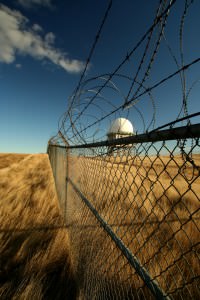The Cold War’s Lasting Effects on the Northern Economy
The negatives and surprising positives of 63 abandoned radar stations.
Written by Megan Harris, Staff Writer
 It’s 2012, and the Cold War is probably the last thing on most peoples’ minds. However, in Northern Canada, this may not be the case. The Distant Early Warning Line, or DEW line, was a project commissioned jointly between the United States and Canada through NORAD. Completed in 1957, it consisted of a network of 63 radar stations built across the North for the purpose of detecting incoming Soviet bombers.
It’s 2012, and the Cold War is probably the last thing on most peoples’ minds. However, in Northern Canada, this may not be the case. The Distant Early Warning Line, or DEW line, was a project commissioned jointly between the United States and Canada through NORAD. Completed in 1957, it consisted of a network of 63 radar stations built across the North for the purpose of detecting incoming Soviet bombers.
There was never actually an attack that necessitated the stations’ use. Eventually, the line was no longer needed, especially after the U.S.S.R.’s collapse in 1993. The Americans withdrew – leaving dozens of abandoned radar stations. The cost of the clean-up was estimated at $600 million, of which the U.S. contributed about $100 million. While some of the clean-up has been completed, a portion of it still remains to be done to this day. For most Canadians this isn’t an issue, but it is for communities in the North, since many of the abandoned sites were contaminated with toxic waste and PCB’s – linked with depleting fish stocks, changes in migration patterns, and disruption of the local aboriginal economies.
In Nunavut, 14 of the 15 DEW line sites that were there were officially closed over the summer of 2011. In June 2011, an Inuit-owned company, Qikiqtaaluk Logistics, won a contract to clean up the last site at Cape Dyer, with operations scheduled to be completed by 2013.
[pullquote]While the sites themselves are hazardous to the environment, the positive side of the clean-up is that it has brought jobs to the local Nunavut economy. [/pullquote]While the sites themselves are hazardous to the environment, the positive side of the clean-up is that it has brought jobs to the local Nunavut economy. Qikiqtaaluk president Harry Flaherty says that Qukiqtaaluk is the only wholly-owned Inuit company performing this clean-up work, and that the contract has injected millions of dollars into the local economy.
“We have Inuit who received training and on the job experience who have gone to become senior civil servants (including a former Mayor of Iqaluit), managers, nurses, teachers, helicopter pilots, and heavy equipment operators. All of these people gained valuable experience from these projects which they would not otherwise have had,” Flaherty says.
Flaherty also said that all the profits from this clean-up project and other sites are reinvested in the local economy. In 2009, during the remediation of the Cape Christian site, Qikiqtaaluk installed a bridge across a river in the surrounding community, since they didn’t have the means to carry out this work themselves.
“This is the only case that I know of where a contractor has made such a lasting impact in a community beyond donating vehicles and equipment they no longer needed,” Flaherty said.
Flaherty added that there are some risks to the work that Qikiqtaaluk is doing. They have to keep sufficient supplies on hand at all times to ensure they can work through extended periods of time, as their location is isolated from help- not to mention that resupply flights could also be delayed by bad weather. They also have a nurse on staff to deal with any medical problems that might come up. They also have wildlife monitors who patrol the clean-up sight 24 hours a day to ensure that animals -especially polar bears- do not approach the work areas. They are also taking precautions to protect workers as much as possible from exposure to hazardous materials.
Despite the risks involved, Flaherty says that the work his company is doing is important, and that he’s already noticed positive environmental effects since the clean-up began.
“It is important for us to continue to make it better for everyone by removing the impacts that past activities have had,” Flaherty says.
ARB Team
Arbitrage Magazine
Business News with BITE.
Liked this post? Why not buy the ARB team a beer? Just click an ad or donate below (thank you!)
Liked this article? Hated it? Comment below and share your opinions with other ARB readers!
























Share the post "The Cold War’s Lasting Effects on the Northern Economy"